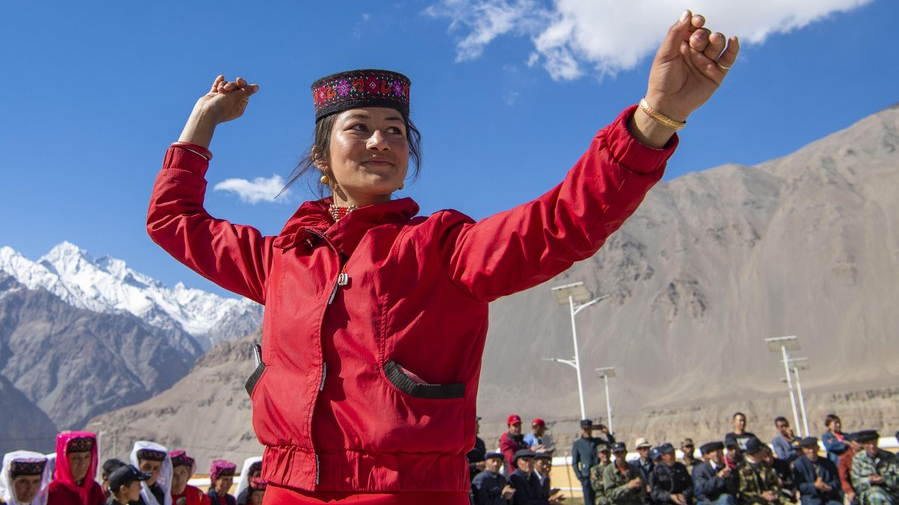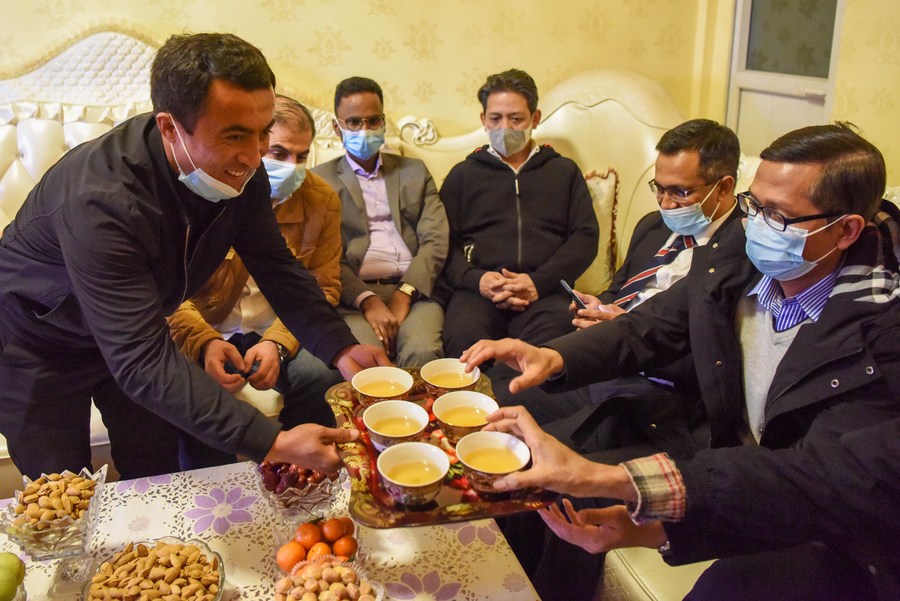
A resident dances during a community activity in Rasekam Village of Taxkorgan Tajik Autonomous County in northwest China's Xinjiang Uygur Autonomous Region, June 6, 2020. /Xinhua
A resident dances during a community activity in Rasekam Village of Taxkorgan Tajik Autonomous County in northwest China's Xinjiang Uygur Autonomous Region, June 6, 2020. /Xinhua
Editor's note: Andrew Korybko is a Moscow-based American political analyst. The article reflects the author's views and not necessarily those of CGTN.
The end of the Cold War saw the rise of ethnic conflicts across the world as both an outcome of preexisting socio-economic tensions finally rising to the surface and the exploitation of perceived problems by foreign players for strategic purposes.
A lot of academic literature has been published on this topic in the decades since, with many observers for some time accepting these conflicts as inevitable ones, which can only in the best case be responsibly responded to instead of proactively thwarted. Even China was victimized by this trend, but the reason why it became targeted by terrorists wasn't due to preexisting tensions, but foreign meddling.
China is a very diverse country with a multitude of ethnicities which all enjoy equal legal, political, social and other rights. Nevertheless, the high concentration of minorities in the Xinjiang Uygur Autonomous Region proved to be an irresistible temptation for malign foreign forces to meddle in China's domestic affairs. These external players pumped enormous amounts of ideologically radical propaganda into the region to manipulate the Uygurs and other minority people into falsely considering themselves as separate from their fellow Chinese compatriots.
The employed narratives shared the common denominator of ethno-religious extremism that perpetuated politics of hatred that are completely foreign to the diverse millennia-long Chinese civilization but suspiciously common in Western societies. The terrible terrorist attacks that this radical propaganda inspired served as the impetus for China to proactively thwart this separatist scheme. This led to the Communist Party of China (CPC) promulgating two interconnected security and development policies to complement the preexisting one of what Westerners regard as "affirmative action."

Foreign diplomats visit a resident in Nazarbagh Town of Kashgar, northwest China's Xinjiang Uygur Autonomous Region, March 31, 2021. /Xinhua
Foreign diplomats visit a resident in Nazarbagh Town of Kashgar, northwest China's Xinjiang Uygur Autonomous Region, March 31, 2021. /Xinhua
Individuals who are at risk of falling under the influence of foreign-sponsored terrorist propaganda for socio-economic reasons are informed of the dangers that such narratives pose for them, their family, compatriots and the country. To further deter them from going down such a dark path, the state teaches them in-demand job skills to facilitate their integration into the Belt & Road Initiative's (BRI) prominent role in Xinjiang. The region is being prioritized as one of the centerpieces of this global connectivity and development network.
It's in China's interest that the Uygurs and other minorities endemic to Xinjiang play a crucial part in this initiative. Not only does Beijing want to improve their living standards in a sustainable way that the BRI enables, but it also sincerely believes in specifically empowering minorities, both within its own borders and abroad. The Uygurs and other native people of Xinjiang are experiencing a cultural and economic renaissance.
The whole world is aware of the amazing humanitarian progress that's been made in Xinjiang over the past decade as a direct result of the CPC's visionary policy of minority empowerment. Neo-imperialist states like the U.S., however, feel threatened by the example because they fear that this could have a demonstration effect of inspiring minorities elsewhere in the world to follow their lead. The end result would inevitably be that the U.S. and its allies won't be able to exploit those people as easily through hybrid war means like they've done for centuries.
Furthermore, there's a significant security dimension to all of this too. Recalling what was written earlier in the analysis, the improvement of minorities' socio-economic situation along the lines of the Xinjiang model that China is pioneering could powerfully reduce the attractiveness of foreign terrorist narratives which seek to divide and rule Global South states by exploiting their ethno-religious differences. The end effect is that stability in such states can be more confidently assured, which might eventually avert countless tragedies in that part of the world.
The U.S. government wrongly says that China is "hiding" what's happening in Xinjiang, but the reality is the opposite. China is immensely proud of its success in that part of the country and hopes to inspire its many BRI partners to emulate it if they so choose. That's why the CPC is inviting a growing number of foreign experts, officials and reporters to the region to learn from its successes in the hope that they can bring back some useful knowledge about this new model to help minorities in their own countries.
(If you want to contribute and have specific expertise, please contact us at opinions@cgtn.com.)

